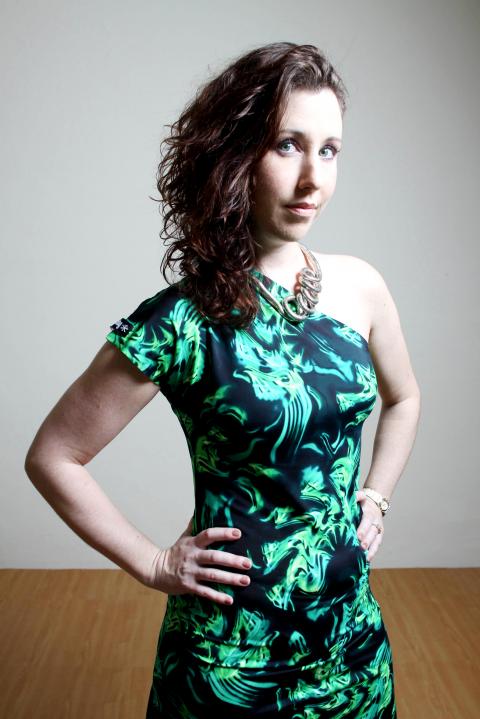For some people, reminiscing about the1990s brings back memories of slap bracelets, Beverly Hills 90210, Beanie Babies, Chris Farley crushing coffee tables and gettin’ jiggy with it. For others, thoughts of the 1990s hark back to Bill Clinton and Monica Lewiniski’s extracurricular activities, Michael Jordan’s complete and utter dominance on the basketball court, the Olsen Twins and Los del Rio’s extraordinarily catchy but extremely cheesy Macarena song and dance.
For Brandon Thompson — singer, bandleader, and self-proclaimed 80’s baby but lover all things 90s — the decade represents the time when he became a man.
“The best music of that decade ran the gamut of musical tastes. Dance music, R&B, hip-hop, metal and even the grunge scene were all forming during a time in our lives when we were trying to figure out who or what we wanted to become,” Thompson told the Taipei Times. “The music offered many of us choices we had never thought about listening to before.”

Photo courtesy of Brandon Thompson
For these reasons, Thompson is throwing the F@#K Yeah 90s! party at Triangle tonight.
THE GENESIS
Mandy Roveda and Sarah Fothergill of theater group Taipei Players kicked around the 90’s party idea, but it never came to fruition. Even though Roveda and Fothergill have both moved on from Taiwan, Thompson is doing a 90’s show complete with 30 musicians, a lip sync battle and DJ Mr. Uppity throwing down the classics at the end of the night, as a dedication to them.
“This idea has been percolating for quite some time,” Thompson said. “They wanted to do an entire night of Karaoke style 90’s music but sadly never got around to putting that show on, so I decided if I am going to do a smorgasbord style live music show I should make it a 90’s night and do it in their honor.”
While the song list for the night is as tightly guarded as the newest Tamagotchi pet device was in 1996, many hints have been tossed out on Facebook including Color Me Badd, Sugar Ray and the white guy from Counting Crows who may or may not have been sleeping on Thompson’s couch since the Y2K bug did not hit. One thing is for certain: there will be eight guitarists, six bassists, four drummers, two keyboard players and nine singers playing over three hours worth of 1990’s music.
Carrie Kellenberger, one of the singers, would only offer a hint.
“Every song I’m singing is a song that every ‘90’s girl sang in their bedroom with a hairbrush in hand.”
F@#K Yeah 90s! A Night of Awesome L!VE MUSIC Friday night from 9:30pm to around 4:00am at Triangle, 1 Yuman St, Taipei City (台北市玉門街1號). Admission is NT$500 and includes a drink.

Oct. 21 to Oct. 27 Sanbanqiao Cemetery (三板橋) was once reserved for prominent Japanese residents of Taipei, including former governor-general Motojiro Akashi, who died in Japan in 1919 but requested to be buried in Taiwan. Akashi may have reconsidered his decision if he had known that by the 1980s, his grave had been overrun by the city’s largest illegal settlement, which contained more than 1,000 households and a bustling market with around 170 stalls. Fans of Taiwan New Cinema would recognize the slum, as it was featured in several of director Wan Jen’s (萬仁) films about Taipei’s disadvantaged, including The Sandwich

“Wish You Luck is not just a culinary experience, it’s a continuation of our cultural tradition,” says James Vuong (王豪豐), owner of the Daan District (大安) Hong Kong diner. On every corner of Kowloon, diners pack shoulder-to-shoulder over strong brews of Hong-Kong-style milk tea, chowing down on French Toast and Cantonese noodles. Hong Kong’s ubiquitous diner-style teahouses, known as chachaanteng (茶餐廳), have been a cultural staple of the city since the 1950s. “They play an essential role in the daily lives of Hongkongers,” says Vuong. Wish You Luck (祝您行運) offers that same vibrant melting pot of culture and cuisine. In

Much noise has been made lately on X (Twitter), where posters both famed and not have contended that Taiwan is stupid for eliminating nuclear power, which, the comments imply, is necessary to provide the nation with power in the event of a blockade. This widely circulated claim, typically made by nuclear power proponents, is rank nonsense. In 2021, Ian Easton, an expert on Taiwan’s defenses and the plans of the People’s Liberation Army (PLA) to break them, discussed the targeting of nuclear power plants in wartime (“Ian Easton On Taiwan: Are Taiwan’s nuclear plants safe from Beijing?”, April 12, 2021). The

Artificial intelligence could help reduce some of the most contentious culture war divisions through a mediation process, researchers say. Experts say a system that can create group statements that reflect majority and minority views is able to help people find common ground. Chris Summerfield, a co-author of the research from the University of Oxford, who worked at Google DeepMind at the time the study was conducted, said the AI tool could have multiple purposes. “What I would like to see it used for is to give political leaders ... a better sense of what people ... really think,” he said, noting surveys gave